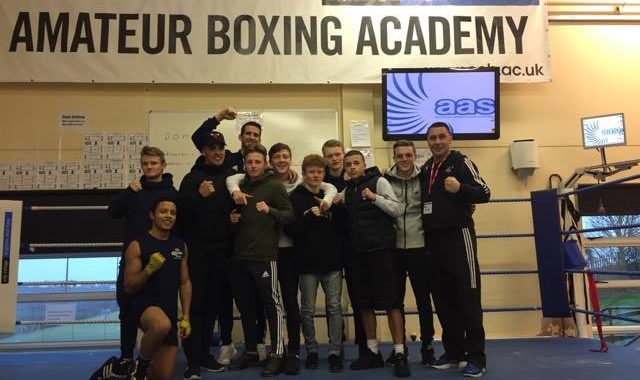National England Talent Pathways Lead Coach Mickey Driscoll came to the AASE Boxing Academy City College Brighton and Hove on Thursday 12th January to talk to the boxing apprentices about mindset, learning culture, ownership and decision making.
‘It was great’, said Moulescoomb’s Liam Forrest. ‘It got me thinking loads about my shadow boxing and what I’m doing and if it’s real……we talked about visualisation of an opponent when we shadow and what responses they would have when we move or punch. It really got me thinking!’
Hillcrest’s Sonny Parkinson said, ‘It made me think about what options I have when I attack, so I set myself a goal to come up with other ways I can attack when at different ranges.’
Unbeaten featherweight Abigail Wawman of St. Gerards recalls, ‘I had to think about my defence selection for the range I was at, it challenged me to think how effective it was, I’m going to use this in my shadow boxing.’
What was particularly engaging was how he used the boxers to peer-analyse each other, a massively effective coaching tool.
The boxers were split in to two groups, one set would choose a style of boxer to shadow box against whilst the others watched to see if they could work out who they were competing against. Then, through the feedback they challenged each other to see if their tactics were correct and if their techniques used were actually suitable for the opponents. You could see the cogs turning in every single one of the boxer’s head – challenging them to problem solve and refine their approach.
‘Ownership! It’s you who are responsible for your own progression. Coaches are there to support you, to suggest, to guide but YOU are the ones who decide whether you want to or not,’ Micky repeated.
The session finished through creating a link to future sessions. The boxers set them self a short term goal of something to improve and something to build upon. ‘I don’t want a technical goal, I want something that you need to do to make you a better athlete, a better boxer, something you must do to ALLOW you to be better prepared to develop, to get better. It could be a lifestyle change, anything. In a month, I’m gonna come back here and see how you’ve progressed, have you taken control?…….’
It was great to see this approach to coaching and development at the elite level, an emphasis on empowerment, not on creating robots. Boxers have a million decisions to make in every split second of a bout and they need to make the right ones.
You don’t lose the ball or concede a goal in boxing if you make the wrong decisions, the consequences are more considerable. Why limit the boxer’s choices through repeatedly ingraining techniques or sequences which have some success but ultimately limited outcomes. We keep creating offensive recognisable patterns which become easier to defend? Why not put the conditions and constraints in to a drill or a spar which facilitates decision making? After all, there’s only a handful of ways you can teach someone to throw a jab. Begin with fundamentals so they have the tools but once they are competent technically and tactically start getting them to decide. You can always guide where needed if they are not on the right path.
Thinking, intelligent boxers.
Problem solvers, adaptable, informed. Sponges.
Here’s an interesting question……Say you coach a boxer for 2 years only and then every coach, including you, suddenly disappeared off the face of the planet, how capable would they be on their own?
Perhaps I, we need to stop always telling our boxers what to do……
